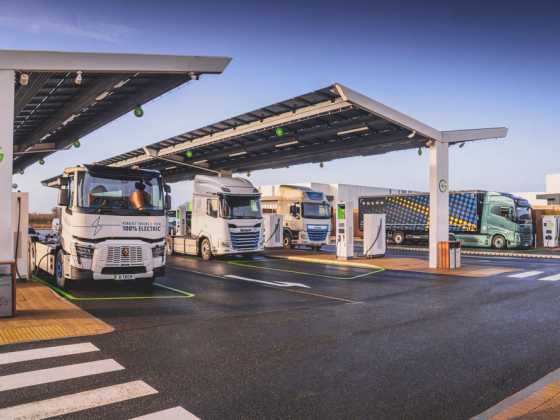Buying into Biodiesel
Biofuels produced and consumed in the UK are some of the most sustainable, low-carbon fuels in the world, argues Brittany Vogel, policy analyst at the Renewable Energy Association (REA)
 Amidst a flurry of anti-biofuels lobbying, campaigners are missing the point that biofuels produced and consumed in the UK and the rest of Europe are some of the most sustainable, low-carbon fuels in the world. Alongside bioethanol, biodiesel provides a means of decarbonising transport using existing vehicle fleets and with little or no investment in new infrastructure.
Amidst a flurry of anti-biofuels lobbying, campaigners are missing the point that biofuels produced and consumed in the UK and the rest of Europe are some of the most sustainable, low-carbon fuels in the world. Alongside bioethanol, biodiesel provides a means of decarbonising transport using existing vehicle fleets and with little or no investment in new infrastructure.
Where UK biodiesel come from
Biodiesel, sometimes referred to as FAME (fatty acid methyl esters) biodiesel, is derived from the crushing of various types of oil seed (e.g. rape seed). The UK market for biofuels (mainly bioethanol and biodiesel) is still very small. Biofuels account for roughly three per cent of transport fuels supplied in the UK, and of this about half is biodiesel. Though still in its infancy, the potential for domestic growth and green jobs in this industry is significant. In a report from the REA on jobs and investment in the UK, it is estimated for 2011/12 the biofuels industry had a turnover of £485 million with approximately 3,500 people employed across the supply chain.
86 per cent of biodiesel consumed in the UK is derived from used cooking oil (UCO), which means that only 14 per cent comes from vegetable oils. Of this, only 0.001 per cent of total biofuel consumed in the UK last year came from palm oil (source: DfT) – and even this tiny fraction met strict sustainability criteria as required by the Renewable Energy Directive (RED). So, while some NGOs cite biodiesel as the root cause of the destruction of the rainforest and the loss of habitat for the orang-utan, it is clear that UK biodiesel use is not the culprit.
Meanwhile palm oil is used in hundreds of products in the local supermarket including soap, chocolate, toothpaste, biscuits, cosmetics and various chemicals.
A sustainable solution
The road transport sector is responsible for about 25 per cent of the UK’s overall carbon emissions. Under the RED, 10 per cent of transport energy must come from renewable sources by 2020. This target will mostly be met with sustainable biofuels, although biomethane and electricity used in electric vehicles (EVs) also count. To count towards the target, biodiesel must currently provide a 35 per cent greenhouse gas (GHG) savings compared to fossil fuels and this will increase to 50 per cent in 2017 and 60 per cent in 2018. On average, biodiesel used in the UK already achieves a 77 per cent GHG saving (Source: DfT). This over-achievement demonstrates industry’s commitment to minimising greenhouse gas emissions.
UCO, which represents a majority of the market for biodiesel, has average savings of 83 per cent (Source: DfT). Recycling cooking oil into biodiesel also prevents it from being poured down drains or sent to landfill. Companies such as Olleco are leading the way in the recycling of these wastes into renewable fuels and working to prevent fraud in the market and illegal dumping of cooking oil wastes.
Biofuels and engine efficiency
Some biofuel critics point to improving engine efficiency as an alternative to using biofuels, but, with such a high proportion of our carbon emissions coming from transport, the reality is that we need both. Improvements in efficiency will not see the major reduction in carbon emissions desperately needed in the transport sector.
Taking the case of electric vehicles, these may provide a longer term answer to the decarbonisation of the transport sector, there are significant barriers to their mass deployment in the short to medium-term.
Firstly, significant investment in infrastructure is needed before the wide spread use of electric vehicles is possible. Secondly, the range of these vehicle fleets is currently between 60-100 miles (if driven carefully). The popularity of these vehicles will depend on increasing the range and decreasing the time it takes to recharge them.
Thirdly, these vehicles are currently significantly more expensive than their internal combustion engine counterparts, largely because of battery cost. Lastly, and most importantly, almost 90 per cent of the electricity used to recharge these vehicles currently comes from fossil fuels. Until the electricity grid is significantly decarbonised, which isn’t likely until well into the 2030s, electric vehicles will be fuelled mostly by fossil fuels.
Blending in
Given the realities of other “low carbon alternatives” blending biodiesel presents a very good option for reducing the carbon emissions from transport in the short to medium term. The use of biodiesel in the EU is currently limited by the standard EN590 which allows for only seven per cent biodiesel to be blended in (or B7). Meanwhile globally there are examples of blends of up to 20 per cent biodiesel in diesel equipment with only minor modifications (or in some cases none at all), provided the fuel meets the EN 14214 standard. Pure biodiesel (B100) can also be used in existing vehicles but may require certain engine modifications to avoid maintenance and performance problems.
As well as being low carbon, there are significant operational benefits of using biodiesel. Fuels blended with biodiesel offers better lubrication than fossil diesel alone by reducing wear and tear on key items such as vehicle fuel pumps, increasing pump life and reducing fleet costs. Biodiesel is effectively a like for like replacement for EN590 and because of the convenience various fleets have been shifting over to higher blends of FAME. Companies across the globe have begun to green their fleets using biodiesel, from global giants like McDonalds to Wiseman Diary in the UK, which is operating a B30 fleet.
Operational experience has shown that care may be needed with higher blend biofuels to prevent water contamination of yard fuel tanks, since higher blends are more prone to picking up water, creating an emulsion that can bind filters in yard pumps. Some manufacturers also suggest more frequent fuel filter changes and engine oil changes. However, this is not always necessary, so oil change by analysis is recommended as with any other vehicle.
Food and Fuel – Supporting UK Industry and Farmers
Anti-biofuel campaigners like the ‘food vs fuel’ tag, but in reality it is not simply one or the other. Biodiesel production from oilseed rape (OSR) yields a high protein animal feed co-product in rape meal, which can substitute for imported soy. This is good news because there is a serious deficiency of domestically produced high protein feed in the EU. Only 30 per cent of animal feed protein is produced domestically. The value of the rape meal co-product from the UK oilseed crush is approximately £60m per year. In addition, 40 per cent of the oil produced by UK crushers goes to biodiesel production, worth £200m in export earnings.
Biodiesel production in the UK has also provided a stable market for UK farmers growing oil seed rape, with consequent benefits in the arable crop rotation.
As opposed to displacing food production, demand for biodiesel has acted as an economic stimulus to greater agricultural productivity. UK OSR yield has increased by 25 per cent over the last 10 years, the period in which the biofuels market has arisen. If this demand diminishes, there will be no automatic reversion to food/feed production. The notion that the land used for crop-based biofuels will be used instead to supply crops for food consumption is theoretical and ignores the working of real markets and the support structure of the Common Agricultural Policy, which effectively makes fallow more economic.
Recent campaigns from anti-biofuel lobbies have also attributed food price spikes in 2008 and 2010 primarily to the diversion of land to biofuels production. In reality, analysis from the European Commission attributed just four per cent of price increases for food oil crops to EU biodiesel consumption. The real culprit was poor harvests caused by adverse weather conditions, which were ironically most likely exacerbated by the climate change which biofuels can help to address.
UK policies leave little room for domestic biofuels
Under new proposals from the European Commission, UK-produced biodiesel is under serious threat. The proposals seek to place a five per cent cap on first generation biofuels (UCO is not included in this) and to attribute indirect land use change (ILUC) factors to crop-based biofuels. The modelling behind these factors is deeply flawed and has not properly taken into account the high protein co-products of biodiesel production.
In the light of these proposals the UK government has held off setting a trajectory to achieving the RED target of 10 per cent renewable transport by 2020. Between unambitious interim target and the lack of a trajectory to 2020, domestically produced biodiesel may be pushed out of the market by biofuel imports which may be cheaper. To accommodate and encourage domestic biofuel production the UK must set a more ambitious target in line with the target set by the Commission.
Greening your fleet with biodiesel
When considering a biodiesel fleet, fuels should be purchased from a quality fuel supplier. The fuel supplier should be able to demonstrate that the fuel meets all quality standards, including EN14214.
The fuel supplier should also have robust sustainability assurance systems in place to demonstrate the provenance of the fuel in line with the RED and the UK’s scheme for meeting the RED target, the Renewable Transport Fuels Obligation (RTFO). The fuel supplier should be able to produce a report on the GHG saving of the fuel being purchased to support fleet GHG reduction claims. This data should always be available as it has to be reported to meet the RED and RTFO.
Fleet operators who may already be enjoying the benefits of using biodiesel may also consider taking an active role in political discussions by asking their MP and MEP to support their business intent to reduce their fleet GHG footprint. They can do this by urging their elected representatives to support the REA position in current European discussions on biofuels use.
Acknowledgments are given to Ian Waller of FiveBarGate Consultants Ltd for his contributions to this article.
Further information
www.r-e-a.net






